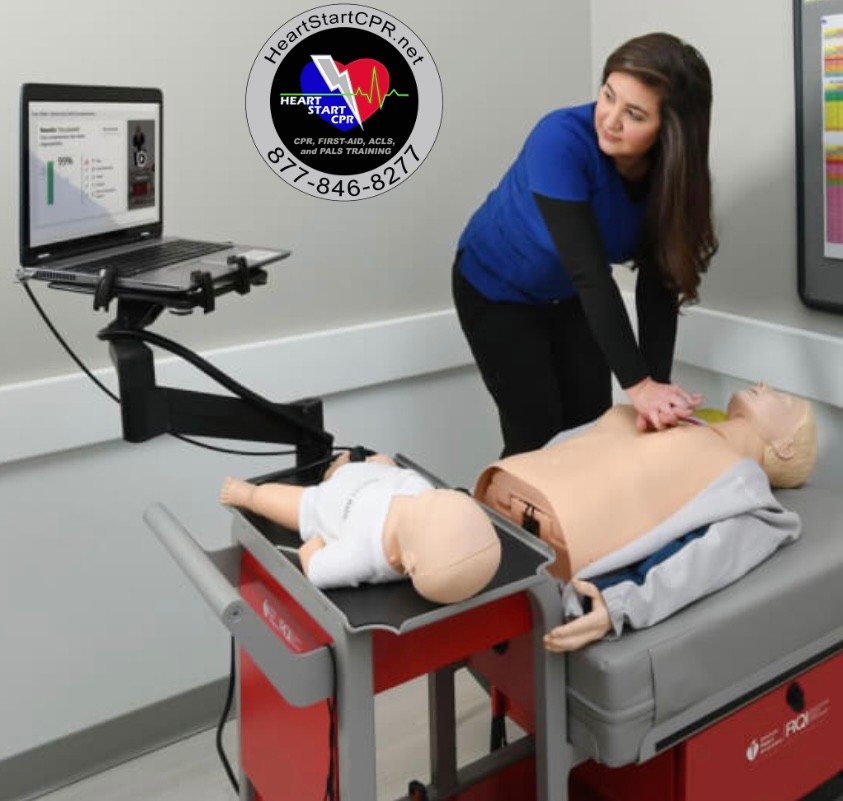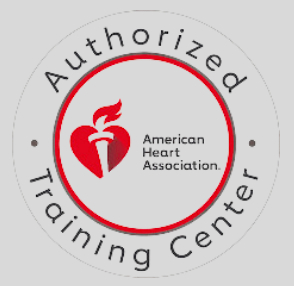




CPR CLASSES FOR DENTISTS

AHA BLS/CPR Class for Dentists - $70

SAME-DAY BLS CERTIFICATION CARD!
The AHA BLS certification for Healthcare Providers is designed to provide a wide variety of healthcare professionals the ability to recognize several life-threatening emergencies, provide high-quality CPR, use an AED, and relieve choking safely, timely, and effectively. Read More
CPR Classes for Dental Assistants
CPR requirements for dentists may vary depending on the state. CPR Certification for Dentists is a must for licensing requirements in California. The California Dental Board requires that dentists maintain current CPR certification in Basic Life Support (BLS) and Automated External Defibrillator (AED) training. The CPR classes for dental assistants and dentists must be taught by a training center or instructor approved by the American Heart Association or the American Red Cross. The Automated External Defibrillator (AED) training must be conducted by an organization approved by the manufacturer of the AED device.
The Dental CPR certification must be renewed every two years, and dentists must provide proof of current certification to the Dental Board upon request. Failure to maintain current CPR certification can result in disciplinary action by the Dental Board, which may include suspending or revoking the dentist's license.
It's important to note that CPR certification requirements for dentists can vary by state and may change over time, so it's always a good idea to check with your state's dental board or licensing agency to ensure that you meet the current requirements.
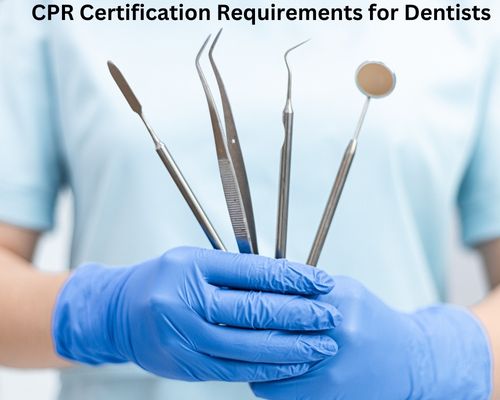
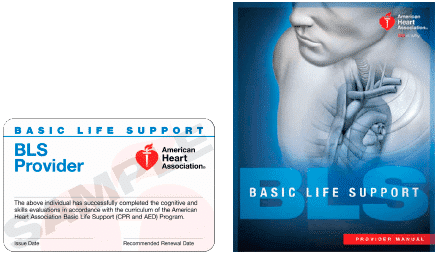
COURSE CONTENT of CPR Training for Dentists
Healthcare Provider level Basic Life Support (BLS)/CPR certification for dentists and dental assistants is required in California.
CPR classes for dental assistants and dentists must include Adult, Child, and Infant CPR and using an AED and bag valve mask.
First Aid training for some dentists may also be required, although this is something that the employer decides.
Course Modality of Dental CPR Certification
The CPR classes for dental assistants and dentists, including CPR certification for Healthcare Professionals, which involves practical skills tests through a classroom or blended training procedure, is a dental assistant CPR requirement in California for dentists and dental assistants.
100% online CPR is only available at the employer's or institution's discretion; it is not recognized by the state licensing board or for continuing education credits.
Companies may demand a particular kind of training or let the state's requirements govern. Confirm the training type and course content with your employer if you need clarification on their requirements.
CPR CERTIFICATION REQUIREMENTS FOR Dentists in CALIFORNIA
- Dentists and Dental assistants in California are required to have healthcare provider-level CPR/BLS(Basic Life Support) Certifications.
- The Dental Board of California states that healthcare provider-level CPR/Basic Life Support (BLS) Courses for Dentists with practical skill components.
- Most employers will ask for the healthcare provider level CPR/BLS as a job requirement.
Dentists and dental assistants can obtain 4 fundamental CE credits for BLS/CPR certification with a practical component from these national organizations for continuing education;
- The Academy of General Dentistry (AGD) Program Approval for Continuing Education (PACE)
- The Dental Assistant National Board (DANB). Each requires Dental Professionals to maintain Cardiopulmonary Resuscitation (CPR) certification for Healthcare Providers with a practical skills component.
- The ADA Continuing Education Recognition Program (CERP) also allows for 4.0 continuing education credits from approved providers.

ENROLL IN BLS CLASS NOW
Take your lifesaving skills to the next level with the Classroom AHA BLS Certification. Join our BLS classes for healthcare providers in the Bay Area at Heart Start CPR!
Why CPR Training for Dentists is Necessary?
To provide safe and effective patient care and respond appropriately in emergencies, CPR training is essential for dentists. There is the importance of CPR training for Dentists for several reasons:
- Emergencies can arise during dental procedures, such as a patient experiencing cardiac arrest or a severe allergic reaction. Dentists and their staff must be prepared to respond quickly and effectively to save a patient's life.
- Dentists often administer sedatives and anesthetics that can cause respiratory depression or airway obstruction, leading to a medical emergency. CPR training for Dentists teaches dental professionals how to recognize and manage these situations.
- In some states, dental CPR certification is required for dental professionals to obtain or renew their license to practice. CPR certification requirements for dentists help ensure dental professionals are adequately trained to handle emergencies.
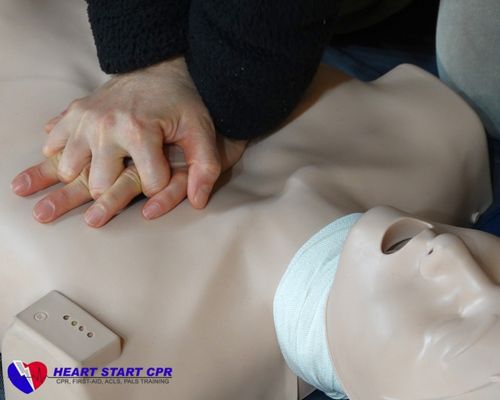
Dental Board of California
BOARD STATEMENT:
- Continuing Education Courses and Providers.
(C) One of the following two courses must be completed to fulfill the prerequisite for certification in basic life support.
(ii) A BLS course offered by a provider recognized by the Academy of General Dentistry's Program Approval for Continuing Education or the American Dental Association's Continuing Education Recognition Program (CERP) (PACE).
The following must be covered in Basic Life Support training for this section:
- Instruction in both adult and pediatric CPR, including two-rescuer scenarios.
- Instruction in foreign-body airway obstruction.
- Instruction in relieving choking in adults, children, and infants.
- Instruction in the use of automated external defibrillation with CPR.
- A live, in-person skills practice session, a skills test, and a skills evaluation.
Academy of General Dentistry (AGD)
BOARD STATEMENT:
142 Medical emergency training and CPR
Training to enable proper response in case of unexpected illness or injury arising during dental treatment or inside the dental office. Medical emergency prevention, action plan formulation, recognizing patient distress, and emergency medications and equipment are possible training subjects.
Dental Assisting National Board (DANB)
Recertification Requirements:
- Every year, earn CDE credits.
One prerequisite for DANB recertification is earning credits for continuing dental education (CDE). Earning CDE credits can be done in several methods, including online and in-person.
- Possess a current CPR certification recognized by DANB.
All DANB-certified individuals must hold current CPR, BLS, or ACLS certification from an organization recognized by the DANB.
Interested in Onsite Training?
Contact us or click the link below if you’re interested in onsite training. Heart Start CPR offers on-site training for corporations, small businesses, schools, and healthcare facilities. On-Site courses are offered using the American Heart Association or American Safety and Health Institution curriculum.
**Note: We also offer Online courses for BLS Online Training
CPR Certifications for Dentists at Heart Start CPR
If you are a dentist looking to improve your skills and knowledge in emergencies, we recommend taking a Basic Life Support (BLS) course for dentists. At Heart Start CPR, we offer a comprehensive BLS course that covers the essential skills and techniques required to provide life-saving care to patients experiencing cardiac arrest, choking, or other medical emergencies. We offer classroom, onsite training, and online Basic Life Support Course for Dentists.
Our BLS course is designed for healthcare providers, including dentists, and covers the latest American Heart Association (AHA) guidelines for CPR and emergency cardiovascular care. During the course, you will learn how to recognize the signs of cardiac arrest, perform high-quality CPR, use an automated external defibrillator (AED), and manage other life-threatening situations.

